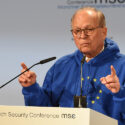No German foreign policy interest is more vital than fortifying a stable Europe

When Germany’s President Joachim Gauck, Defense Minister Ursula von der Leyen and Foreign Minister Frank-Walter Steinmeier argued at the Munich Security Conference in early 2014 that Germany would need to assume greater responsibility in foreign and security policy, the world was still comparatively stable and European security relatively intact.
Since then, however, with the annexation of Crimea and the war in Ukraine, Europe’s security order has plummeted into a grave crisis. Moreover, Syria’s civil war has evolved into a regional conflagration that has also led to the greatest refugee catastrophe since the end of World War II. Terror attacks by the Islamic State have hit cities across Europe. The new US president openly questions American treaty obligations. And the list goes on. The arguments made by Gauck, von der Leyen, and Steinmeier are even more pertinent today.
EU foreign and security policy represents a particularly promising and important focus of German initiative. Over the past decades, Germany has benefitted from a peaceful Europe that is politically and economically integrated in the European Union and anchored in NATO.
If Berlin acted resolutely on promoting EU external action, Germany would be able to advance Europe’s global influence – and thereby its own – and could also find a way to avoid falling into the “hegemony trap” Berlin faced during the financial crisis and the Euro crisis. Germany could thus simultaneously further two key strategic objectives: a stronger, more capable EU, and a European Germany fully committed to collective European action.
After all, the central principle of German foreign policy applies today just as it has in past decades: without Europe, all is for nought. Responding to today’s uncertainties with a renewed focus on the nation state cannot forge a path to peace and prosperity. No German foreign policy interest is more important than the creation and preservation of a stable European environment.
In the aftermath of the financial crisis, the Euro crisis, Brexit and the rise of right-wing populism, one thing seems obvious to many: a majority of Europe’s citizens wants less Europe rather than more Europe, and more self-determination and control at the level of the individual state. While this may be true for some policy areas, it does not, in fact, apply to foreign and security policy. According to a Pew Research Center survey from the spring of 2016, 74 percent of respondents across ten EU member states favor a more active role for the EU in world affairs. In Germany, too, 74 percent endorsed this idea, while only 18 percent would prefer to see the EU assume a less active role.
Thus, even as Europeans have generally grown more skeptical of the EU, they sense very clearly that nation states are too small, too insignificant and too weak to address immense foreign and security challenges on their own. Citizens are well aware that Europe can only defend its interests across the globe if it does so collectively through effective EU foreign and security policy.
Currently, however, there is hardly any policy area where the gap between ambition and reality is wider than in the field of European foreign and security policy – not only in Germany, but all across Europe. Indeed, foreign and security policy has often been an area of particular discord between member states. But more courageous European decisions are now beginning to emerge, and there is a growing understanding that a common EU foreign and security policy is indispensable – even more so since Donald Trump’s election in the US.
While these developments are important, they represent little more than a first step in the right direction. What are the next steps for the EU? And how can German policy sustain and promote this process?
- Germany must substantially strengthen its institutions, EU diplomacy and its crisis prevention measures.
The 2009 Treaty of Lisbon already provides a basis for a more coherent advancement of a common European foreign policy. The treaty created, among other things, the position of the Council President and of the High Representative for Foreign Affairs and Security Policy – two offices that have already achieved important milestones. For example, during the Iran negotiations, the three largest EU member states sat at the table, yet negotiations were led – under the European flag – by High Representative for Foreign Affairs and Security Policy Catherine Ashton and her successor Federica Mogherini. As a result, all member states, including smaller ones, could feel fully involved. Yet unfortunately, when it comes to foreign policy crises and challenges, such as ending the wars in Ukraine and Syria, European institutions are still often assigned a secondary role.
Finding an easy-to-use formula should not be that difficult, as noted by former Polish Foreign Minister Radek Sikorski: member states could initially decide whether a certain foreign policy issue would best be addressed unilaterally or collectively. If the answer calls for a collective approach, EU institutions would then need to be given leeway and provided with any assistance they need.
However, without a wellstocked toolbox consisting of both military and civilian instruments, Europeans cannot protect their interests or values.
Diplomacy in Syria provides an unfortunate yet fitting example. Several European governments – as well as Washington – demanded an end to the Assad regime, but rhetoric did not become action. In some diplomatic formats that seek to end conflicts, European states are underrepresented or not even included, even though Europe is the political entity in Syria’s immediate neighborhood and the one most affected by the flow of refugees. The EU cannot afford to act like a diplomatic dwarf.
What is more, the opportunities the Treaty of Lisbon allows are not exceedingly radical. Why not go a step further and decide foreign policy issues by vote of a qualified majority? In how many important questions would Germany have likely been overruled? German foreign policy has nothing to fear. By starting an initiative towards a decisionmaking model based on a qualified majority, Berlin could send a powerful signal underlining its commitment to concerted European action.
The EU enjoys the advantage of a comprehensive toolbox, even if it is not exactly full. Brussels can send not only military troops, but also experts in the fields of constitutional reform, law enforcement and many other areas. Crisis prevention and rebuilding efforts in our neighboring regions are particularly likely to increase in importance, an eventuality for which we are insufficiently prepared. For instance, Europe’s contribution to the stabilization efforts following the 2011 civil war in Libya has been absurdly small.
To ensure that the EU’s efforts are adequately funded, it should consider introducing a new foreign policy guideline such as a “3-percent criterion” for more international commitment. This would entail spending at least 3 percent of GDP on crisis prevention, development assistance and defense. There is also an unmet 2-percent goal for defense expenditures, an unmet 0.7-percent goal for development cooperation as well as other small budgetary items. A holistic discussion of the necessary expenditures would be sure to benefit the public discourse on foreign policy. - European integration in defense matters must move forward. Despite several steps in the right direction, the defense policies of EU member states suffer from fragmentation. Large sums of money are spent inefficiently and ineffectively on a policy area that has remained largely excluded from the benefits of integration.
The Netherlands’ willingness to put significant military units under the command of the German armed forces has been a welcome step. Other projects, such as the European Air Transport Command, are rightly considered successful examples of deeper cooperation. Smaller bilateral and multilateral projects have been initiated. But what are the next milestones? Essential steps of military integration will not be feasible without a classic topdown decision-making model at the level of EU heads of state and heads of government.
In any case, the need for action is enormous. Gradually increasing national defense budgets will not be enough to fill the significant gaps. Our eastern NATO partners have understandable fears regarding their territorial integrity. And the US will perhaps not fulfill its role as Europe’s protector the way it once did, which leaves a dramatically different strategic situation. Make no mistake about it: creating a European defense union is a long-term task. Europe still needs NATO and the support of the US. However, this does not at all reduce the importance of working towards a defense union. - There are other important measures that can be promoted by German foreign and security policy within the EU framework.
Above all, Europe must aim to take clear positions towards a United States with Trump at the helm. When it comes to issues of critical importance – such as the Iran Deal and the Paris climate agreement – Europe must lobby relentlessly for common viewpoints. The EU must also ensure that no member state makes a deal with the US government that would come at the expense of other member states. The US may pursue a foreign policy that is focused on bilateral transactions with individual EU members – an approach that, if successful, would weaken the EU in its entirety.
There also exists an urgent need for action to strengthen homeland security. While Europe has the Schengen Area, there is a glaring lack of cross-border collaboration by police and intelligence services. Whether Europe can fight terrorism while having open borders will determine if its citizens believe in the EU’s capability to provide security and retain control, which is why small-scale improvements in police cooperation simply do not suffice. When will there be a European FBI? Or at least an expansion of the role of Interpol?
There are several obvious tasks where German initiatives and actions can and should strengthen EU foreign and security policy. As Henry Kissinger once said, Germany is too small for the world and too big for Europe. There is a single solution to this dilemma: only as a part of Europe is Germany big enough for the world – without beeing too big for Europe.
A version of this article appeared in print in February, 2017, with the headline “Big League”.
Wolfgang Ischinger, a former German ambassador to the United Kingdom and the United States, is chairman of the Munich Security Conference.
“World’s best think tank conference”
The Munich Security Conference was voted the world’s best think tank conference in 2016 by the Think Tanks and Civil Societies Program (TTCP) of the Lauder Institute at the University of Pennsylvania. It is the fourth straight year the MSC was ranked first.
Over 2,500 university faculty and administrators, journalists, policymakers, think tank scholars, think tank executives and donors from every region of the world participated in the 2016 Global Go To Think Tank Index (GGTTI). The MSC ranked ahead of the Institute for International Political Studies (ISPI, Italy), Shangri-La Dialogue (Singapore), French Institute of International Relations (IFRI, France) and the Brookings Institution (US).
The TTCSP conducts research on the role policy institutes play in governments and civil societies around the world. Often referred to as the “think tanks’ think tank,” TTCSP examines the evolving role and character of public policy research organizations



